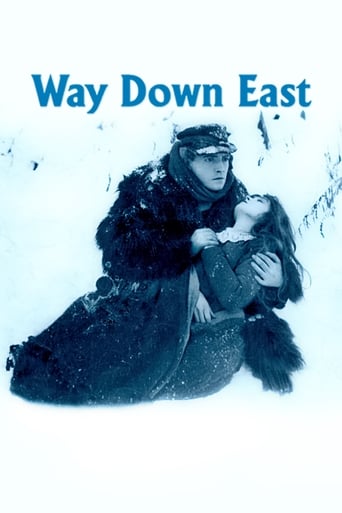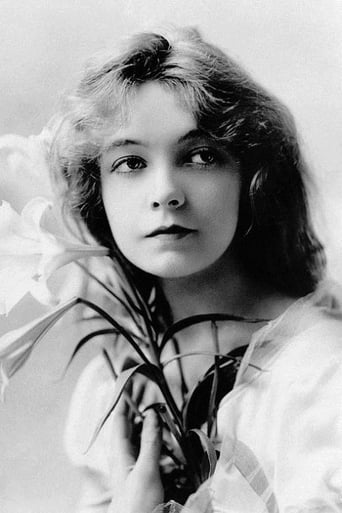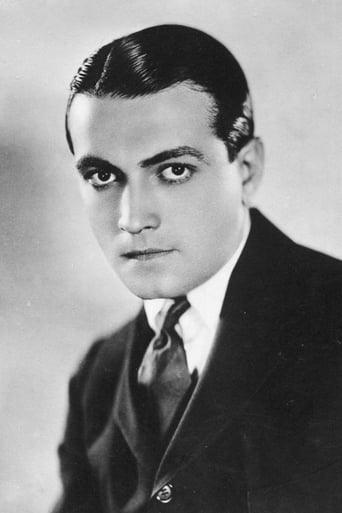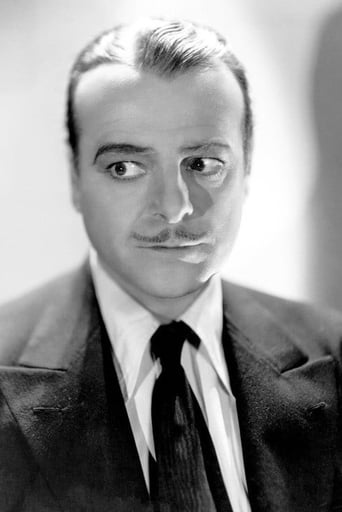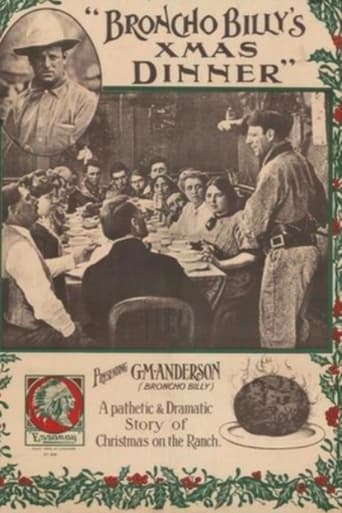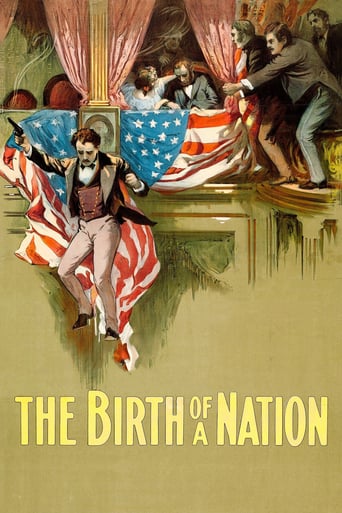Way Down East (1920)
A naive country girl is tricked into a sham marriage by a wealthy womanizer, then must rebuild her life despite the taint of having borne a child out of wedlock.
Watch Trailer
Cast
Similar titles
Reviews
Very very predictable, including the post credit scene !!!
At first rather annoying in its heavy emphasis on reenactments, this movie ultimately proves fascinating, simply because the complicated, highly dramatic tale it tells still almost defies belief.
what a terribly boring film. I'm sorry but this is absolutely not deserving of best picture and will be forgotten quickly. Entertaining and engaging cinema? No. Nothing performances with flat faces and mistaking silence for subtlety.
All of these films share one commonality, that being a kind of emotional center that humanizes a cast of monsters.
From director D.W. Griffith (The Birth of a Nation, Orphans of the Storm), this is one of the first few silent films to be listed in the book 1001 Movies You Must See Before You Die, I am obviously keen to complete as much of it as possible, and it was easy to get the chance to see this title. Basically Lennox Sanderson (Lowell Sherman) is the rich, handsome man-about-town, but he is amongst those that are exceptionally selfish and think only of themselves and their own pleasure, and he has found himself a vulnerable victim to be part of his inconsiderate scheme. Anna Moore (Intolerance's Lillian Gish) is the innocent poor country girl who meets Lennox, who convinces her he has feelings, and she is tricked into believing a fake wedding, and he just he just uses her, has his way with her, and then he leaves her when he finds out she is pregnant with his baby. The child is born and named Trust Lennox, but she has no choice but to care for the baby herself, and after some time tragedy strikes when the baby dies, and in deep despair she wanders the streets trying to find work and ways to get by. Anna eventually finds a job working with Squire Bartlett (Burr McIntosh), and she meets his son David (Richard Barthelmess), he falls in love with her but she rejects any attempted advances towards her because her traumatic past, and worse comes when Lennox returns. He is seen lusting after local girl Kate Brewster - the Squire's Niece (Mary Hay), and when he sees his former wife he tries to convince her to leave, possibly with him, she refuses but does promise that she won't reveal anything to anyone about the past with him. Eventually though Squire Bartlett learns from Martha Perkins (Vivia Ogden), the town gossip, about Anna's past, and in anger he throws her out into a snow storm, but before leaving she does tell about Lennox, respected by all, about what he did to her and being the father to her dead baby. While she is getting lost in the storm which rages on, a search party is formed by leader David, she is unconscious and floating down the icy river towards the waterfall, but at the last moment she is rescued by David, and in the final scene Anna and him get married. Also starring Mrs. David Landau as Anna Moore's Mother, Josephine Bernard as Mrs. Emma Tremont, Mrs. Morgan Belmont as Diana Tremont and Norma Shearer as Barn Dancer. Gish gives an eloquent and engaging performance as the young woman who goes through trauma and heartache and you can feel a lot of sympathy for, the other cast members act very well also, the visual elements definitely make the film distinctive, I admit the story without any sound was a little hard to follow at times, and the film could have been shortened somewhat, nearly lasting three hours, but with memorably watchable moments it is a worthwhile silent melodrama. Very good!
D.W. Griffith, quite possibly the man most associated with silent film as a dramatic artform, certainly the one that most comes to mind when limited to director-only (ruling out do-it-all auteurs like Chaplin and Keaton), and he is a creator of much of the universal language as well as the collective consciousness of silent film, the epic lengths, the recognizable intertitles, and of course, the glorious, copious melodrama, and there are few films that pack more melodrama into one over-the-top package than Way Down East.Way Down East follows the exploits of naive country girl Anna (Lillian Gish), who, after falling in even harder times, decides to come into contact with distant associates of wealth. One of these, cynical womanizer playboy Lennox (Lowell Sherman) attempts to court her, in an attempt to know her biblically. She, being a respectable young woman, of course refuses to indulge until she is married, so Lennox stages a sham marriage, does his business, and leaves her. Oh, but of course, he has also left her with, you guessed it, a CHILD! Once he got his way, Lennox refuses to have anything to do with her, and she is forced to raise the child on her own. She moves into a slummy apartment and is forced to claim that her husband has died, but those inquisitive patricians cannot let it lie, and discovers she was never officially married! Then, right on cue, the baby dies (or as the titles so sensationally put it, "a cold hand on her breast"). Once she is finally outed as a hussy harlot tramp have-not wench by the 'have's, she is forced to admit to her new beau that she is not only a virgin, but a hussy harlot tramp have-not wench, and is thus obliged to out her baby's daddy, and then, all hell breaks lose.Is there anyone else more perfect or practiced at this sort of histrionic theatricality than Lillian Gish? She had eyes to kill, a brittle delicacy that looks like you could shatter her with a sneeze, and the fact that everyone was always threatening to beat her up. Most of the rest of the cast are unremarkable silent veterans like Richard Barthelmess and Burr McIntosh, although Lowell Sherman plays affluent prick so well I'm convinced it was his own vocation.At 145 minutes, the film is way too long, including far too many characters and a lot of plot strands that don't really go anywhere, but this is really all part of the bloated indulgence of pure, undiluted melodrama, and although the film isn't 'great' in the objective sense, there's certainly a lot to be entertained by here.{Grade: 6/10 (C+) / #2 (of 2) of 1920}
Lillian Gish (as Anna Moore) lives with her poor mother in Greenville, a remote New England village. A sore need for money demands Ms. Gish leave for Boston, to appeal to some wealthy relatives, the Tremonts. Richard Barthelmess (as David Bartlett) lives elsewhere; "though of plain stock, he has been tutored by poets and visions wide as the world." In the city, Gish meets Lowell Sherman (as Lennox Sanderson). Mr. Sherman's hobby is "ladies, Ladies, LADIES!"; specifically, he is interested in the sexual conquest of virginal young women. Gish's delicate beauty is "a whip to Sherman's jaded appetite"; and, she innocently enters his clutches. Sherman tricks Gish into a mock marriage, and leaves her pregnant Deceptively subtitled "A Simple Story of Plain People"; possibly, director D.W. Griffith was seeking to enhance his film's dramatic twists and turns; since, while Gish's "Anna" could be considered of "plain" stock, what happens her could not be called "simple". This film reunites Lillian Gish and Richard Barthelmess, after the successful "Broken Blossoms" (1919); their "Way Down East" performances are also stunning, though Barthelmess has less to do this time around. The spectacular ending is still riveting after all these years; but, it works best after you've seen the preceding story of degradation and love.The flaw in "Way Down East" may be Griffith's overindulgence in ludicrous "slapstick"-type humor; this is most explicit in Edgar Nelson's "Hi Holler" character, which really lays an egg. The silliness also rears its ugly head on Creighton Hale's occasionally cow-licked crown. Neither "True Heart Susie" (1919) nor "The Greatest Question" (1919) veered so wildly into this form of lunacy. But, in the end, these indulgences cannot diminish the great performances, and spectacular ending of "Way Down East". The "great ice-break" is absolutely indispensable. ********** Way Down East (9/3/20) D.W. Griffith ~ Lillian Gish, Richard Barthelmess, Lowell Sherman, Creighton Hale
WAY DOWN EAST (United Artists, 1920), subtitled "a simple story about plain people," reunites director D.W. Griffith with his BROKEN BLOSSOMS (1919) co-stars, Lillian Gish and Richard Barthelmess, in an old-fashioned story based on a vintage play that turned out to become something of a commercial success and one of the true classics of the silent screen to be still remembered today. Aside from the simple-minded story consisting of country people and snobbish relatives, with a tragic heroine, a farm boy and an interloper of society whose three specialties happen to be "ladies," "ladies" and "ladies," heading the cast, it's most crucial scene, set during a violent snow storm, is the key factor of the entire photo-play, given the most realistic effect filmed on location in Vermont during the dead of winter, with Gish suffering more in real life in the freezing cold than the heroine she was portraying. And how she suffered for the art of film making as demonstrated with the close-up of Gish's frozen face in the snow storm sequence. Set in a remote village in New England, the story begins with Anna Moore (Lillian Gish), a poor girl living with her widowed mother (Mrs. David Landau) who has fallen into hard times. At her request, Mrs. Moore advises Anna to seek aid from her rich relatives in Boston. Upon her arrival at the Tremont mansion, the snobbish daughters treat Anna like an outsider, while playboy Lennox Sanderson (Lowell Sherman), one of the party guests, takes a sudden interest in her. Because of her naive ways, Anna falls into the clutches of Lennox, who tricks her into a mock marriage and bound to secrecy from his father from whom he lives on his support. When Anna discovers she is going to have a child, she insists that he tell his family. Lennox on the other hand tells her the truth about not really being married, and walks out on her. After her mother dies, Anna seeks seclusion in a rooming house where she has her baby alone. Because the child is ill, she sends for a doctor, but it is too late. The child is dead. Since there is no proof of her having a husband, Anna is turned out by an unsympathetic landlady, Mrs. Poole (Emily Fitzroy), which leads her to a farm where she is taken in and cared for by the kindly Mrs. Bartlett (Kate Bruce), even though her husband, the Squire (Burr McIntosh), "the richest farmer in the neighborhood," has his suspicions. Anna finds love and happiness with their son, David (Richard Barthelmess), but things start to fall apart upon the arrival of Lennox, along with Martha Perkins (Viva Ogden), the town gossip, learning the truth about Anna's past, thus spreading the news to the Squire, who then orders the grief-stricken Anna out of his house, into the cold.The popularity of WAY DOWN EAST prompted reissues in later years in shorter prints, with the trimming of some comedy relief and other scenes from its original 140 to 107 minutes. For decades, a 1930s reissue with Vitaphone sounding score, often similar to the underscoring of THE JAZZ SINGER (1927), was the version available for theatrical and later video cassette from various distributors, notably Blackhawk and Grapevine Video. It's interesting to point out that while this is and remains a classic of the silent screen, why television revivals were limited? The icy river sequence was clipped for the American Film Institute tribute to Lillian Gish when televised in 1983. Even by watching this scene that leaves anyone with a cold feeling would want to go see this movie. Another scene worth noting is the crucial one where Anna (Gish) performs her own baptism on her dead baby, "Trust Lennox." In 1984, WAY DOWN EAST made news in movie magazines when, after five years of hard work, was restored to its original length and revived at the Museum of Modern Art in New York City, much to the delight of silent film enthusiasts. Although the shorter version is an audience pleaser, the longer version does help make sense to the missing scenes such as whatever became of Anna's mother, for example. However, comparing the two, the restored version gives credit to the leading players and their roles in the opening while the restored version, available on both VHS and DVD format through Kino Video, does not, although its re-recording to the original soundtrack sounds almost similar to the 1930s reissue, slightly slower in tempo, but good overall.Other members of the cast include: Josephine Bernard (Mrs. Tremond); Porter Strong (Seth Holcomb); George Neville (Reuben Whipple); Edgar Nelson (Hi Holler); and Creighton Hale (Professor Sterling).Unlike BROKEN BLOSSOMS, where the characters played by Barthelmess and Gish are of equal status, WAY DOWN EAST belongs to Gish while Barthelmess has little to do, except for the key scene near the end. As famous as WAY DOWN EAST has become, the 1935 Fox Film remake starring Rochelle Hudson and Henry Fonda is something to consider in comparing to the original, but as remakes go, there's no comparison to the original, especially with the sincere performance by Lillian Gish giving one of her best screen performances of his career. Regardless of this being old-fashioned film making in the D.W. Griffith tradition, it's old-fashioned appeal and timeless theme that's actually part of the charm. Watch for it whenever it plays again on Turner Classic Movies. (***)
